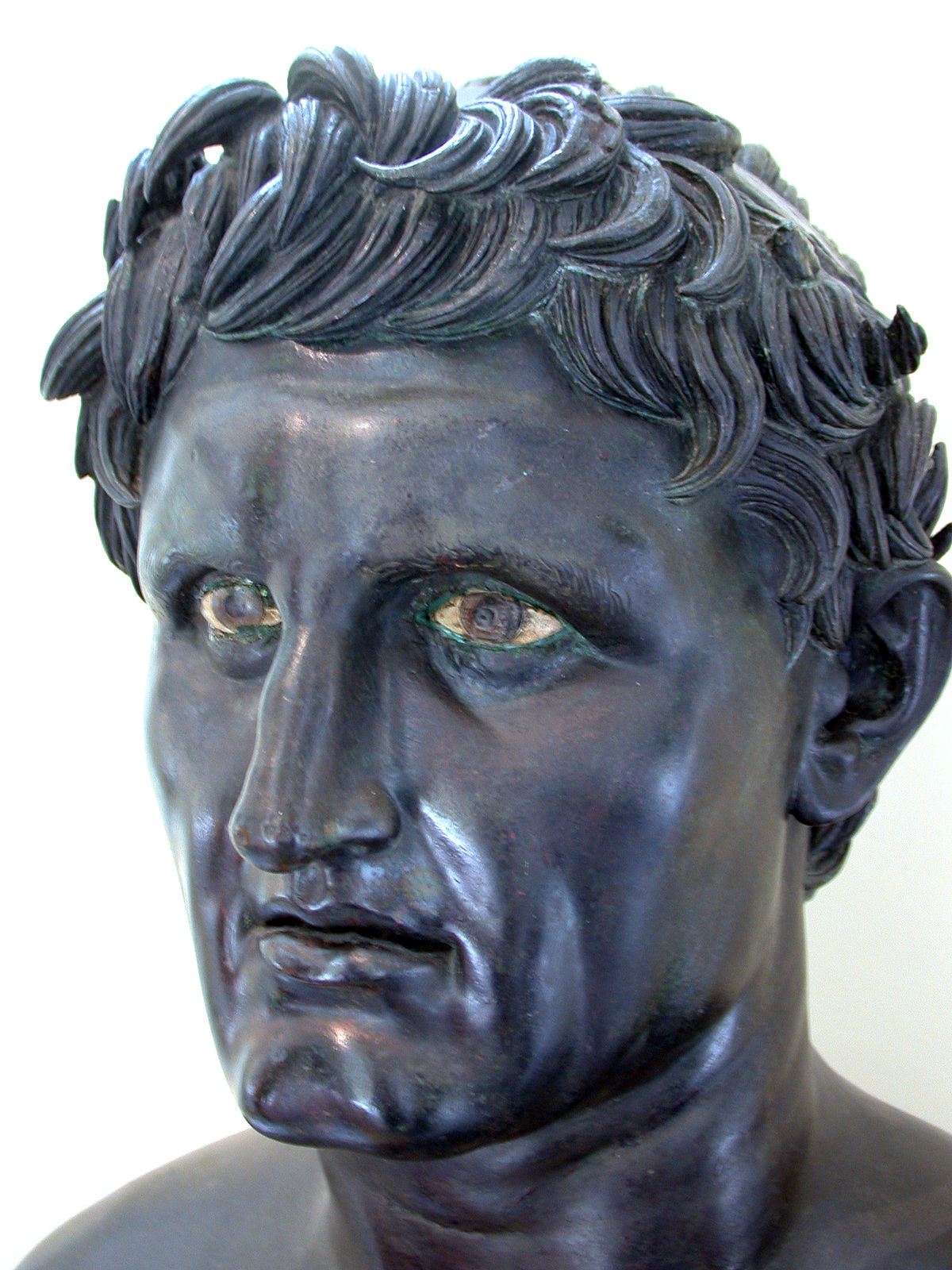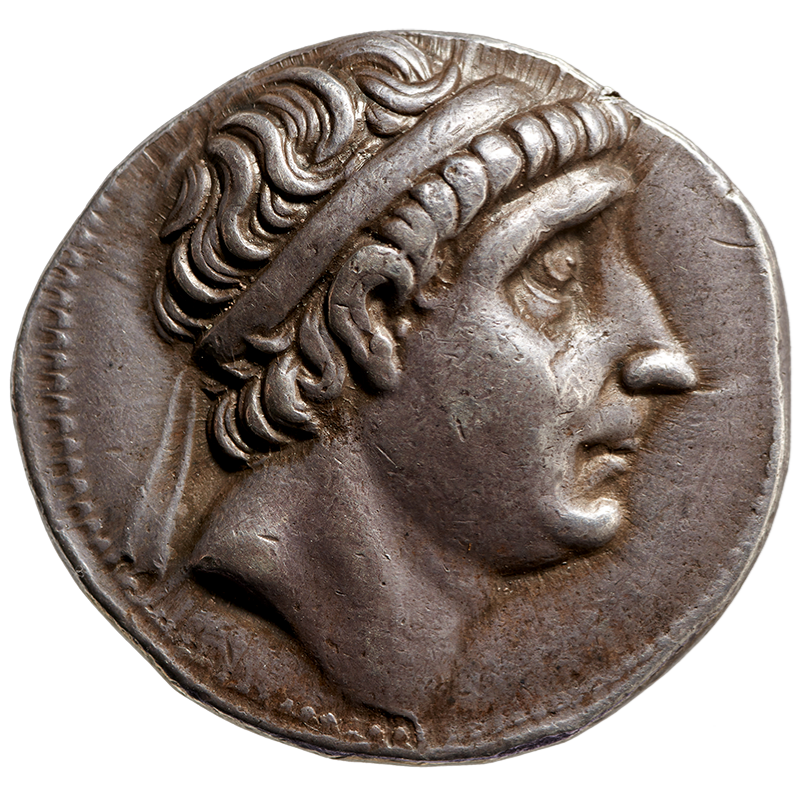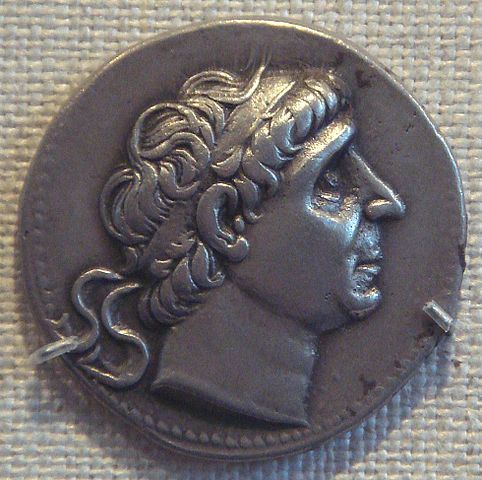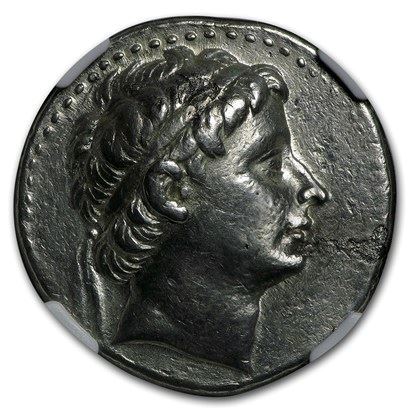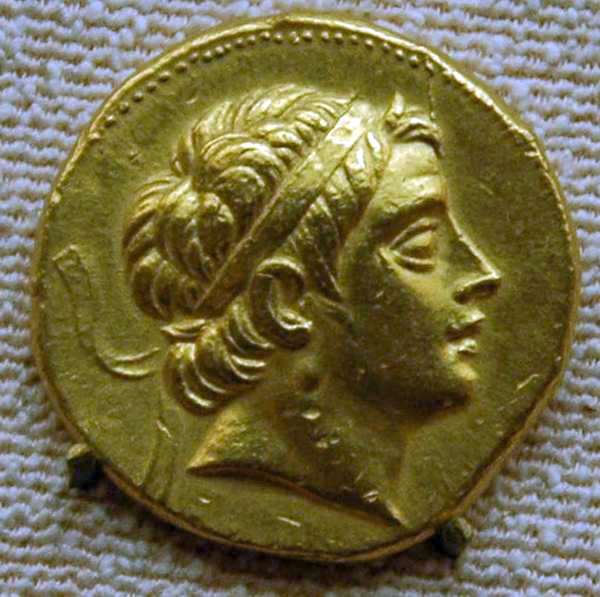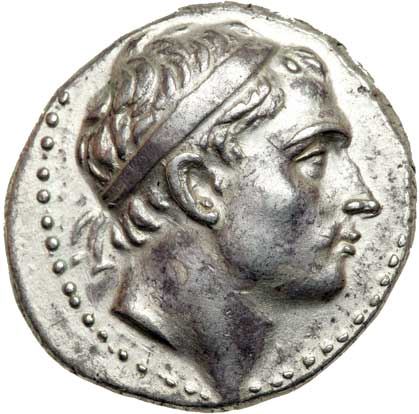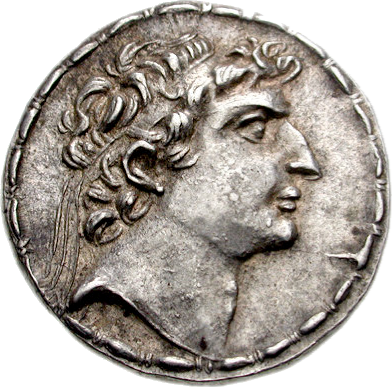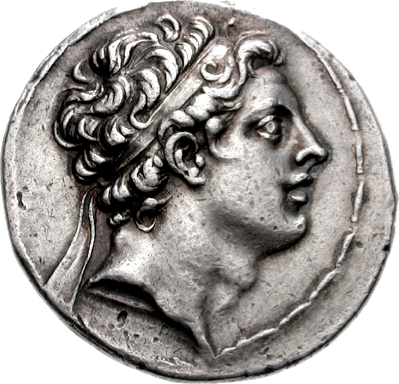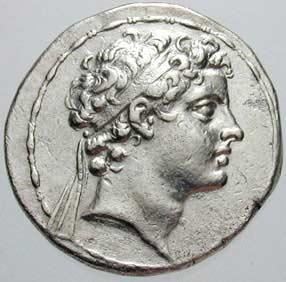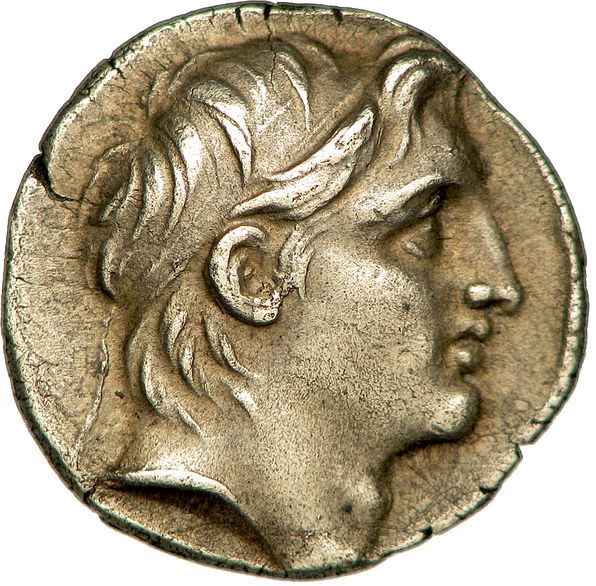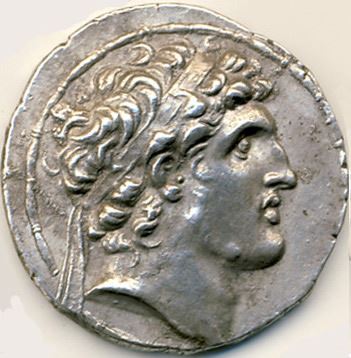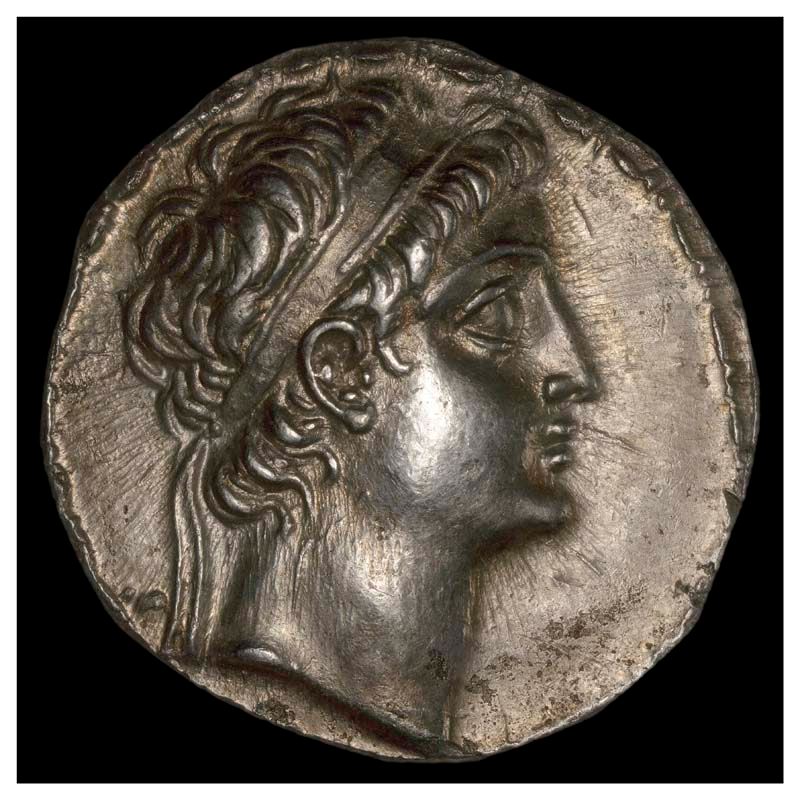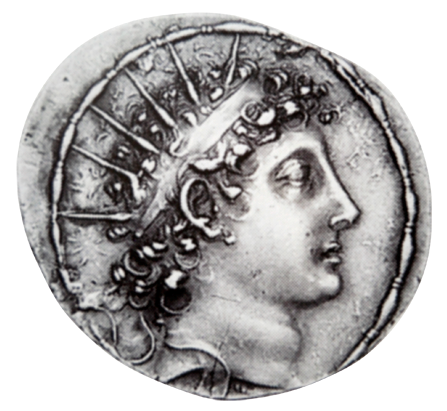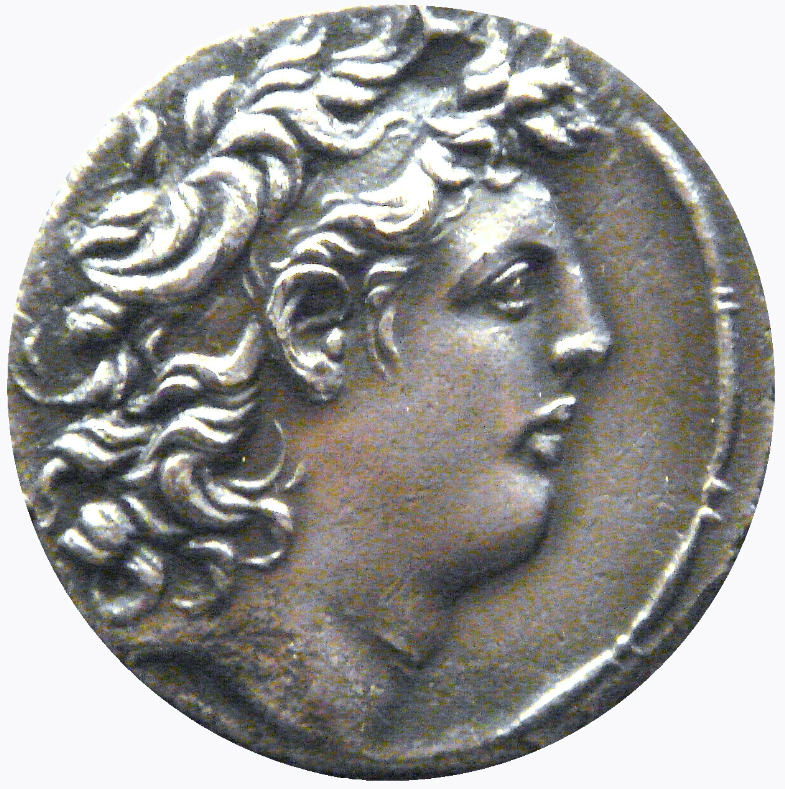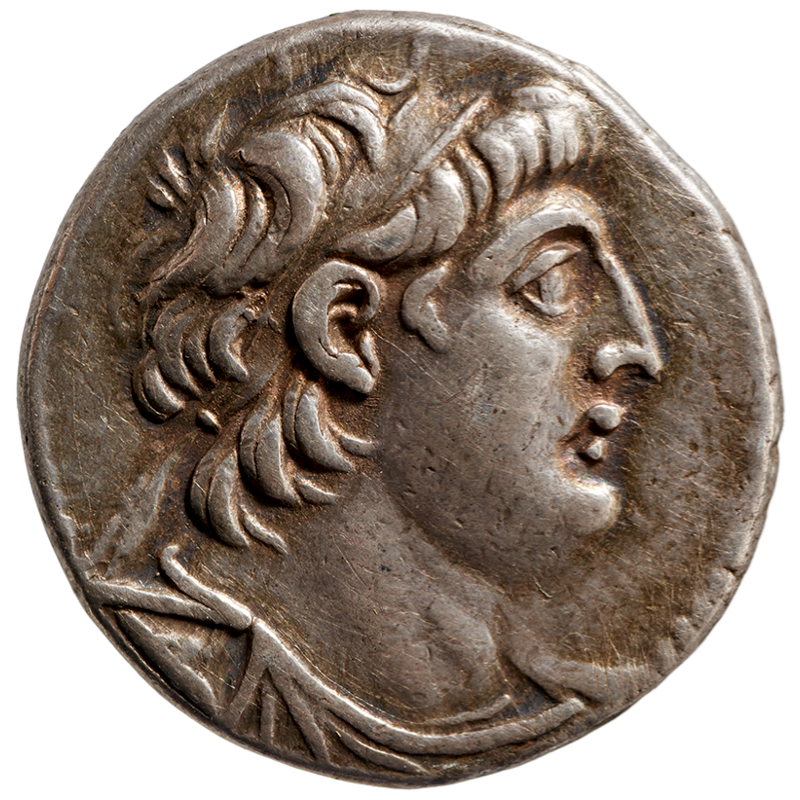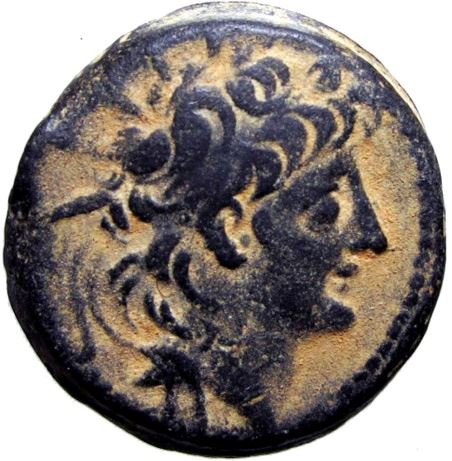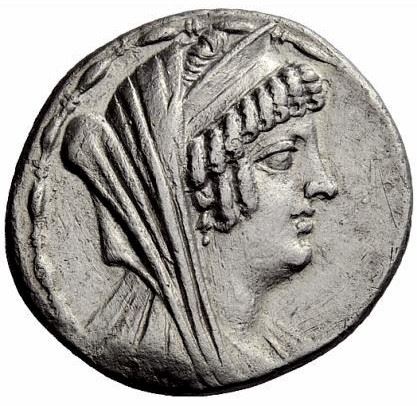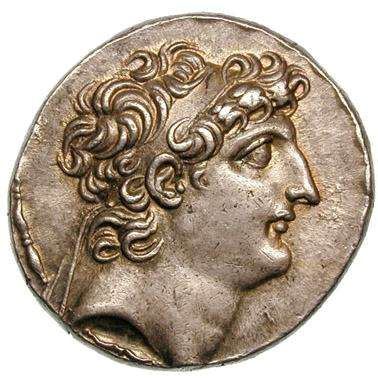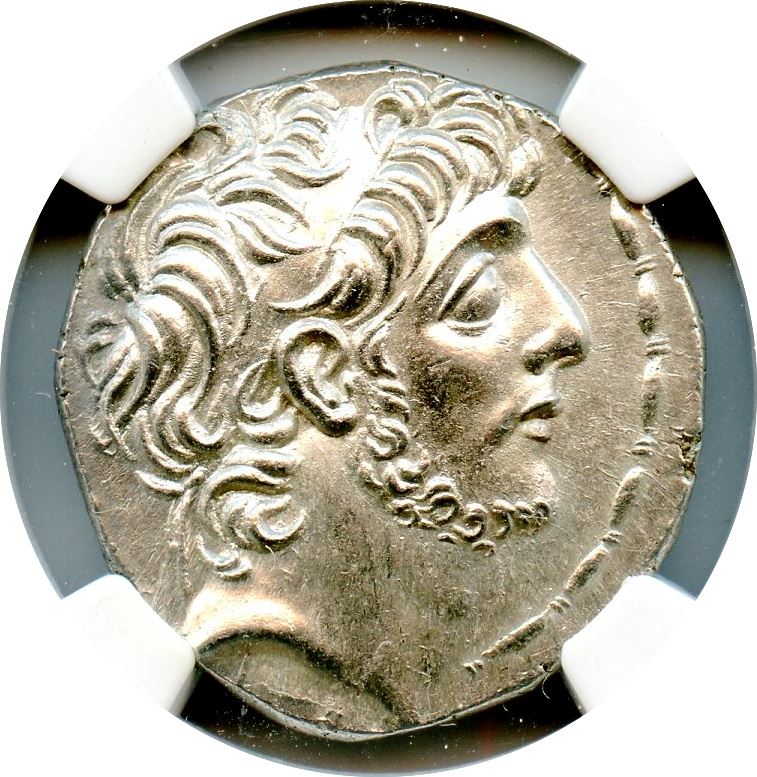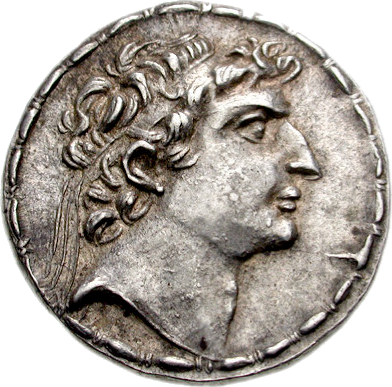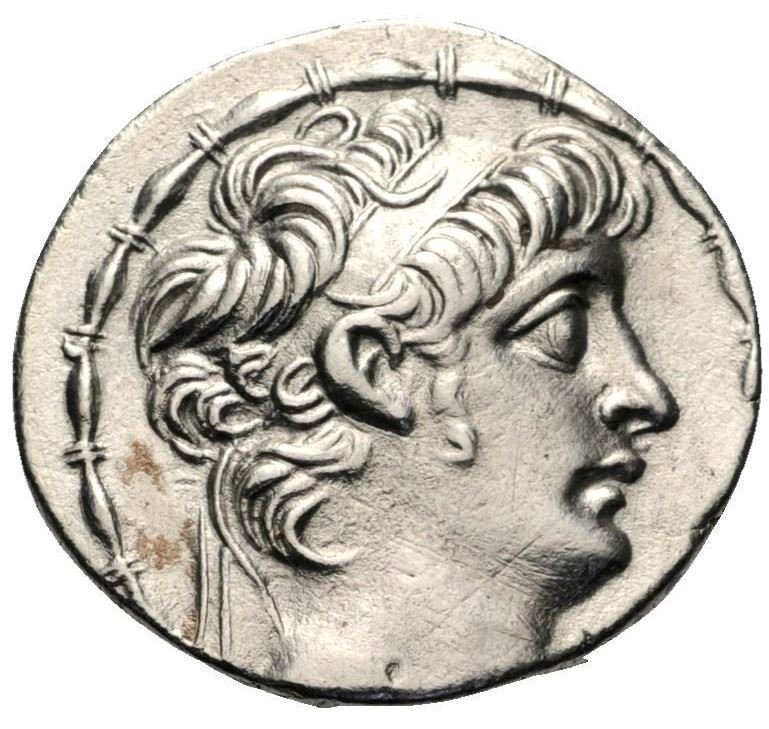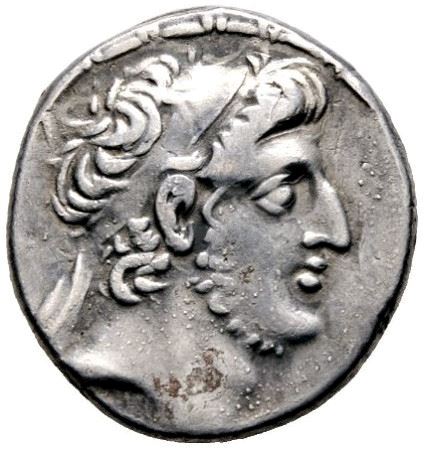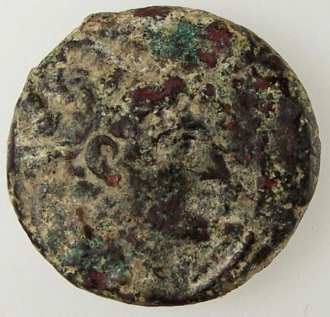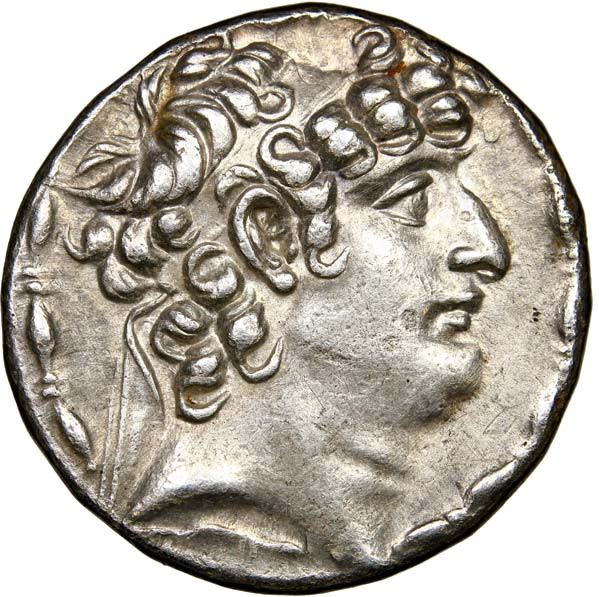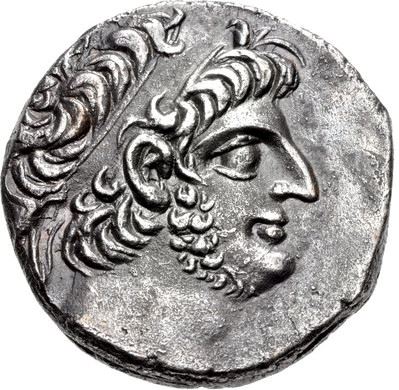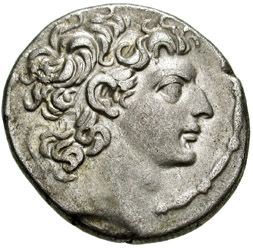The Seleucid Empire was a Hellenistic state ruled by the Seleucid dynasty, which existed from 312 BC to 63 BC; it was founded by Seleucus I Nicator following the division of the Macedonian empire vastly expanded by Alexander the Great.
The Seleucid Empire was a major center of Hellenistic culture that maintained the preeminence of Greek customs where a Greek political elite dominated, mostly in the urban areas. The Greek population of the cities who formed the dominant elite were reinforced by immigration from Greece.
The Seleucid Empire eventually clashed with the Roman Republic, and following a series of defeats was reduced to a minor state around the capital of Antioch. By 63 BC, Pompey the Great did away with the sad remains and created the Roman province of Syria instead.
The Seleucid Empire was a major center of Hellenistic culture that maintained the preeminence of Greek customs where a Greek political elite dominated, mostly in the urban areas. The Greek population of the cities who formed the dominant elite were reinforced by immigration from Greece.
The Seleucid Empire eventually clashed with the Roman Republic, and following a series of defeats was reduced to a minor state around the capital of Antioch. By 63 BC, Pompey the Great did away with the sad remains and created the Roman province of Syria instead.

Seleukos I was one of the Diadochi - 'successors' to Alexander III 'the Great'.
Having previously served as an infantry general under Alexander the Great, he eventually assumed the title of basileus and established the Seleucid Empire over much of the territory in the Near East which Alexander had conquered.
Seleucus founded a number of new cities during his reign, including ...
Having previously served as an infantry general under Alexander the Great, he eventually assumed the title of basileus and established the Seleucid Empire over much of the territory in the Near East which Alexander had conquered.
Seleucus founded a number of new cities during his reign, including ...
Antiochus I 'Soter' was a king of the Hellenistic Seleucid Empire. He succeeded his father Seleucus I Nicator in 281 BC and reigned until his death in 261 BC.
Antiochus I was half Persian, his mother Apama, daughter of Spitamenes, being one of the eastern princesses whom Alexander the Great had given as wives to his generals in 324 BC.
In 294 BC, Antiochus married his stepmot...
Antiochus I was half Persian, his mother Apama, daughter of Spitamenes, being one of the eastern princesses whom Alexander the Great had given as wives to his generals in 324 BC.
In 294 BC, Antiochus married his stepmot...
Antiochus II was a Greek king of the Hellenistic Seleucid Empire who reigned from 261 to 246 BC. He succeeded his father Antiochus I Soter in the winter of 262–61 BC. He was the younger son of Antiochus I and princess Stratonice, the daughter of Demetrius Poliorcetes.
He inherited a state of war with Ptolemaic Egypt, the "Second Syrian War", which was fought along the coasts of Asia Min...
He inherited a state of war with Ptolemaic Egypt, the "Second Syrian War", which was fought along the coasts of Asia Min...
Seleucus II was a ruler of the Hellenistic Seleucid Empire, who reigned from 246 to 225 BC.
After the death of his father, Antiochus, he was proclaimed king by his mother, Laodice in Ephesos, while her partisans at Antioch murdered Berenice and her son, another Antiochus. This dynastic feud began the Third Syrian War. Ptolemy III, who was Berenice's brother and the ruler of Egypt, invad...
After the death of his father, Antiochus, he was proclaimed king by his mother, Laodice in Ephesos, while her partisans at Antioch murdered Berenice and her son, another Antiochus. This dynastic feud began the Third Syrian War. Ptolemy III, who was Berenice's brother and the ruler of Egypt, invad...
Seleucus III was a ruler of the Hellenistic Seleucid Kingdom, the eldest son of Seleucus II Callinicus and Laodice II.
His birth name was Alexander and he was named after his great uncle the Seleucid official Alexander. He changed his name to Seleucus after he succeeded his father as King.
After a brief reign of three years (225–223 BC), Seleucus was assassinated in Anatoli...
His birth name was Alexander and he was named after his great uncle the Seleucid official Alexander. He changed his name to Seleucus after he succeeded his father as King.
After a brief reign of three years (225–223 BC), Seleucus was assassinated in Anatoli...
Antiochus III was a Hellenistic Greek king and the 6th ruler of the Seleucid Empire.
Rising to the throne at the age of eighteen in 222 BC, his early campaigns against the Ptolemaic Kingdom were unsuccessful, but in the following years Antiochus gained several military victories and substantially expanded the empire's territory. His traditional designation, the Great, reflects an epithe...
Rising to the throne at the age of eighteen in 222 BC, his early campaigns against the Ptolemaic Kingdom were unsuccessful, but in the following years Antiochus gained several military victories and substantially expanded the empire's territory. His traditional designation, the Great, reflects an epithe...
Seleucus IV was king of the Hellenistic Seleucid Empire from 187 BC to 175 BC.
He was the second son and successor of Antiochus III the Great and Laodice III. Seleucus IV married his sister Laodice IV, by whom he had three children: two sons Antiochus, Demetrius I Soter and a daughter Laodice V.
He was compelled by financial necessities, created in part by the heavy war-inde...
He was the second son and successor of Antiochus III the Great and Laodice III. Seleucus IV married his sister Laodice IV, by whom he had three children: two sons Antiochus, Demetrius I Soter and a daughter Laodice V.
He was compelled by financial necessities, created in part by the heavy war-inde...
Antiochus IV was a Hellenistic Greek king of the Seleucid Empire from 175 BC until his death in 164 BC.
He was a son of King Antiochus III the Great. His original name was Mithradates (alternative form Mithridates); he assumed the name Antiochus after he ascended the throne.
Notable events during the reign of Antiochus IV include his near-conquest of Egypt, his persecution of...
He was a son of King Antiochus III the Great. His original name was Mithradates (alternative form Mithridates); he assumed the name Antiochus after he ascended the throne.
Notable events during the reign of Antiochus IV include his near-conquest of Egypt, his persecution of...
Antiochus V was ruler of the Greek Seleucid Empire from 163–161 BC.
He was only 9 years old when appointed king by the Romans, and the real power resided with his regent, Lysias. The true heir to the throne, Demetrius, was kept as a hostage in Rome following the peace treaty of Apamea.
Lysias and Demetrius did not scrap all the warships and war elephants promised in the peace...
He was only 9 years old when appointed king by the Romans, and the real power resided with his regent, Lysias. The true heir to the throne, Demetrius, was kept as a hostage in Rome following the peace treaty of Apamea.
Lysias and Demetrius did not scrap all the warships and war elephants promised in the peace...
Demetrius I was ruler of the Hellenistic Seleucid Empire between 161 and 150 BC.
He was sent to Rome as a hostage during the reign of his father Seleucus IV Philopator. When his father was murdered by his finance minister Heliodorus in 175 BC., his uncle Antiochus IV Epiphanes killed the usurper, but usurped the throne himself.
When Antiochus IV died in 163 BC, his 9-year-ol...
He was sent to Rome as a hostage during the reign of his father Seleucus IV Philopator. When his father was murdered by his finance minister Heliodorus in 175 BC., his uncle Antiochus IV Epiphanes killed the usurper, but usurped the throne himself.
When Antiochus IV died in 163 BC, his 9-year-ol...
Alexander Balas was the ruler of the Greek Seleucid kingdom in 150–146 BC. Alexander defeated Demetrius Soter for the crown in 150 BC.
Alexander was a native of Smyrna of humble origin, but pretended to be the son of Antiochus IV Epiphanes and heir to the Seleucid throne.
Alexander's claims were recognized by the Roman Senate, Ptolemy Philometor of Egypt and others. He marrie...
Alexander was a native of Smyrna of humble origin, but pretended to be the son of Antiochus IV Epiphanes and heir to the Seleucid throne.
Alexander's claims were recognized by the Roman Senate, Ptolemy Philometor of Egypt and others. He marrie...
Demetrius II was one of the sons of Demetrius I Soter, brother of Antiochus VII Sidetes, and ruled the Seleucid Empire for two periods, separated by a number of years of captivity in Parthia.
In 147 BC, he overthrew Alexander I Balas and regained his fathers throne. However, Demetrius was not a popular king. The people of Syria had little respect for the young boy, who had come to pow...
In 147 BC, he overthrew Alexander I Balas and regained his fathers throne. However, Demetrius was not a popular king. The people of Syria had little respect for the young boy, who had come to pow...
Antiochus VI was the son of Alexander Balas, and the formal ruler of the Seleucid Empire from 145 BC and until 141 BC.
Antiochus VI did not actually rule. Either already in 145 or in early 144 BC he was nominated by the general Diodotus Tryphon as heir to the throne in opposition to Demetrius II, and remained the general's tool.
He died in 142 or 141 BC - some sources claim h...
Antiochus VI did not actually rule. Either already in 145 or in early 144 BC he was nominated by the general Diodotus Tryphon as heir to the throne in opposition to Demetrius II, and remained the general's tool.
He died in 142 or 141 BC - some sources claim h...
Diodotus Tryphon was a king of the Hellenistic Seleucid Empire who initially acted as regent and tutor for the son of Alexander Balas.
Soon after the death of his charge, Antiochus VI, he convinced the army to elect him king, taking the titles of Basileus, as was tradition for Hellenistic kings, but also that of Autokrator. The term Autokrator is unique in the fact that it is not inclu...
Soon after the death of his charge, Antiochus VI, he convinced the army to elect him king, taking the titles of Basileus, as was tradition for Hellenistic kings, but also that of Autokrator. The term Autokrator is unique in the fact that it is not inclu...
Antiochus VII was king of the Seleucid Empire from 138 to 129 BC. He was the last Seleucid king of any stature. He became King when he defeated the usurper Tryphon, and laid siege to Jerusalem in 132. During the siege he allowed a seven-day truce for the Jews to celebrate a religious festival, impressing the Jewish leadership.
Antiochus spent the final years of his life attempting to r...
Antiochus spent the final years of his life attempting to r...
Alexander II Zabinas ruled the Greek Seleucid kingdom from 129-123 BC.
Zabinas was a false Seleucid who claimed to be an adoptive son of Antiochus VII Sidetes, but in fact seems to have been the son of an Egyptian merchant named Protarchus. Antioch, Apamea, and several other cities, disgusted with the tyranny of Demetrius, acknowledged the authority of Alexander.
He was used...
Zabinas was a false Seleucid who claimed to be an adoptive son of Antiochus VII Sidetes, but in fact seems to have been the son of an Egyptian merchant named Protarchus. Antioch, Apamea, and several other cities, disgusted with the tyranny of Demetrius, acknowledged the authority of Alexander.
He was used...
Cleopatra Thea was the ruler of the Seleucid Empire from 125 BC after the death of Demetrius II Nicator, and until 121 or 120 BC, some of the time in co-regency with her son Antiochus VIII Grypus
She grew up in Egypt as the daughter of Ptolemy VI and Cleopatra II. In 150 BC she married Alexander Balas, but was later remarried to Demetrius II. He was defeated and captured by the Parthia...
She grew up in Egypt as the daughter of Ptolemy VI and Cleopatra II. In 150 BC she married Alexander Balas, but was later remarried to Demetrius II. He was defeated and captured by the Parthia...
Seleucus V was the eldest son of Demetrius II Nicator and Cleopatra Thea, and ruled the Seleucid Empire for a short time in 126 BC.
Two different motives are given as reason for this deed: according to one ve...
Two different motives are given as reason for this deed: according to one ve...
Antiochus VIII was ruler of the Seleucid Empire between 125 BC and 96 BC, initially alongside his mother, Cleopatra Thea.
He was crowned as a teenager in 125 BC after his mother Cleopatra Thea had killed his elder brother Seleucus V. After Antiochus defeated Alexander Zabinas in 123 BC, his mother tried to poison him with wine, but the suspicious king forced her to drink the cup herself...
He was crowned as a teenager in 125 BC after his mother Cleopatra Thea had killed his elder brother Seleucus V. After Antiochus defeated Alexander Zabinas in 123 BC, his mother tried to poison him with wine, but the suspicious king forced her to drink the cup herself...
Antiochus IX was the son of Antiochus VII Sidetes and Cleopatra Thea, and ruler of the Seleucid Empire from 116–96 BC. He ruled alongside his brother Antiochus VIII Grypus.
According to the description given by Diodorus, Antiochus IX resembled Antiochus IV in character and certainly resembled him in hostility to the Jews. The circumstances were different, however. The relative strength ...
According to the description given by Diodorus, Antiochus IX resembled Antiochus IV in character and certainly resembled him in hostility to the Jews. The circumstances were different, however. The relative strength ...
Seleucus VI was the oldest son of Antiochus VIII Grypus and his wife Tryphaena, and ruled the Seleucid Empire from 96-95 BC.
In 96 BC, he defeated his half-uncle Antiochus IX Cyzicenus in revenge for his father's death. However, the score was evened the next year (95 BC) by Antiochus X Eusebes, the son of Antiochus Cyzicenus, and Seleucus was forced to flee from Syria to Mopsuestia in C...
In 96 BC, he defeated his half-uncle Antiochus IX Cyzicenus in revenge for his father's death. However, the score was evened the next year (95 BC) by Antiochus X Eusebes, the son of Antiochus Cyzicenus, and Seleucus was forced to flee from Syria to Mopsuestia in C...
Antiochus X was king of the Seleucid Empire from 95-92 BC, alongside a number of other claimants to the throne.
Beginning his reign in 95 BC, his first achievement was to defeat his double half-cousin/second cousin Seleucus VI Epiphanes, and avenging the recent death of his father Antiochus IX Cyzicenus.
After that, he ruled Antioch and its surroundings, fighting endlessly a...
Beginning his reign in 95 BC, his first achievement was to defeat his double half-cousin/second cousin Seleucus VI Epiphanes, and avenging the recent death of his father Antiochus IX Cyzicenus.
After that, he ruled Antioch and its surroundings, fighting endlessly a...
Demetrius III was the son of Antiochus VIII Grypus and his wife Tryphaena, and ruled the Seleucid Empire for a very short time in 95 BC.
By the assistance of Ptolemy IX of Egypt, he recovered part of Syria in 95 BC, and held his court at Damascus, from where he tried to enlarge his domain. To the south he defeated the Maccabean king Alexander Jannaeus in battle, following a request for...
By the assistance of Ptolemy IX of Egypt, he recovered part of Syria in 95 BC, and held his court at Damascus, from where he tried to enlarge his domain. To the south he defeated the Maccabean king Alexander Jannaeus in battle, following a request for...
Antiochus XI was a son of Antiochus VIII Grypus and his wife Tryphaena.
Antiochus XI was a brother of Seleucus VI Epiphanes and a minor participant in the civil wars which clouded the last years of the once glorious Seleucids, now reduced to local dynasties in Syria.
Following the defeat of his brother in 95 BC by Antiochus X Eusebes, Antiochus XI and yet another brother, Ph...
Antiochus XI was a brother of Seleucus VI Epiphanes and a minor participant in the civil wars which clouded the last years of the once glorious Seleucids, now reduced to local dynasties in Syria.
Following the defeat of his brother in 95 BC by Antiochus X Eusebes, Antiochus XI and yet another brother, Ph...
Philip I Philadelphus was the fourth son of Antiochus VIII Grypus and his wife Tryphaena.
Philip I took the diadem in 95 BC together with his brother (probably twin) Antiochus XI Epiphanes, after the eldest son Seleucus VI Epiphanes was killed by their cousin Antiochus X Eusebes. He established himself in Antiochia after 92 BC and survived attacks from younger brother Demetrius III Euc...
Philip I took the diadem in 95 BC together with his brother (probably twin) Antiochus XI Epiphanes, after the eldest son Seleucus VI Epiphanes was killed by their cousin Antiochus X Eusebes. He established himself in Antiochia after 92 BC and survived attacks from younger brother Demetrius III Euc...
Antiochus XII ruled the Seleucid Empire from 87-84 BC. He was the fifth son of Antiochus VIII Grypus and Tryphaena to take up the diadem.
He succeeded his brother Demetrius III Eucaerus as separatist ruler of the southern parts of the last remaining Seleucid realms, basically Damascus and its surroundings.
Antiochus initially gained support from Ptolemaic forces and was the...
He succeeded his brother Demetrius III Eucaerus as separatist ruler of the southern parts of the last remaining Seleucid realms, basically Damascus and its surroundings.
Antiochus initially gained support from Ptolemaic forces and was the...
Seleucud VII Philometor ruled the sad remains of the Seleucid Empire from 83-69 BC.
In reality, he was probably nothing more than a local dynast with complicated family ties. Seleucus was unknown until recently, but from coins issued by him and his mother, Ptolemaic princess Cleopatra Selene, it is presumed that he was her son by king Antiochus X Eusebes, and a brother of later king Ant...
In reality, he was probably nothing more than a local dynast with complicated family ties. Seleucus was unknown until recently, but from coins issued by him and his mother, Ptolemaic princess Cleopatra Selene, it is presumed that he was her son by king Antiochus X Eusebes, and a brother of later king Ant...
Antiochus XIII Asiaticus was one of the last rulers of the sad remains of the Seleucid Empire, which he ruled from 69-64 BC as a client king under Pompeius Magnus.
He was son of king Antiochus X and Cleopatra Selene. Some time after Tigranes had conquered Syria (83 BC), she traveled to Rome to have her sons recognized as kings of Egypt, but to no avail.
Selene was eventually...
He was son of king Antiochus X and Cleopatra Selene. Some time after Tigranes had conquered Syria (83 BC), she traveled to Rome to have her sons recognized as kings of Egypt, but to no avail.
Selene was eventually...
Philip II Philoromaeus was the son of the Seleucid king Philip I Philadelphus, and briefly ruled the renains of the Seleucid Empire after the death of his second cousin Antiochus XIII Asiaticus.
No coins of Philip II are known, which is unusual for Seleucid rulers. Seleucus V Philometor is the only other king for whom this is the case. This may indicate that Philip did not rule in any o...
No coins of Philip II are known, which is unusual for Seleucid rulers. Seleucus V Philometor is the only other king for whom this is the case. This may indicate that Philip did not rule in any o...

